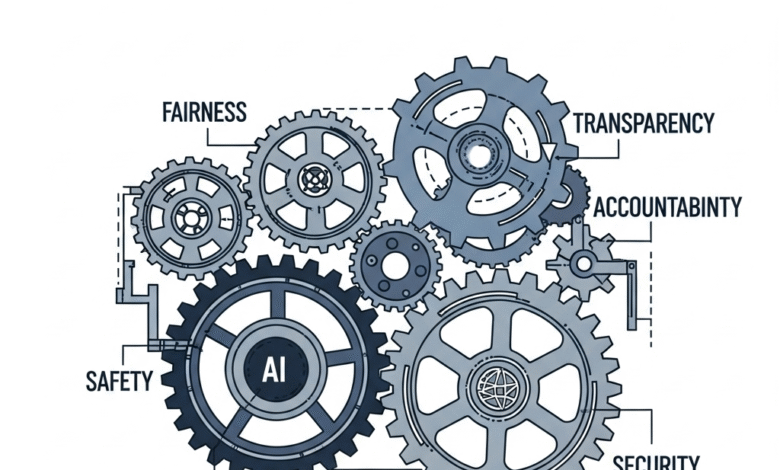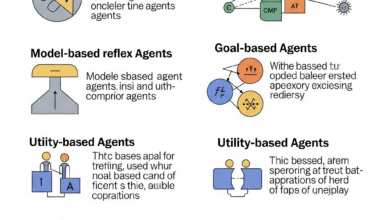Artificial Intelligence Governance Framework
America’s Blueprint for Ethical, Compliant AI

Artificial Intelligence Governance Framework
Artificial Intelligence Governance Framework : America’s Blueprint for Ethical, Compliant AI
Hey risk-conscious innovators! As AI rockets from labs to boardrooms, 53% of U.S. companies admit their AI deployments lack proper guardrails (MIT Sloan, 2024). From biased hiring algorithms to hallucinating chatbots, ungoverned AI isn’t just risky—it’s a legal, financial, and reputational time bomb. Enter the artificial intelligence governance framework: your strategic playbook for harnessing AI’s power while protecting your business. Let’s cut through the complexity and build future-proof AI the right way.
🚨 Why Every American Company Needs an Artificial Intelligence Governance Framework Now
The stakes have never been higher:
-
Regulatory Tsunami: 32 U.S. states have pending AI laws + FTC crackdowns
-
Financial Risk: Class actions against biased AI cost UnitedHealth $14M in 2023
-
Consumer Trust: 78% of Americans distrust ungoverned AI (Pew Research)
-
Operational Meltdowns: Zillow’s unmonitored AI caused a $881M housing valuation disaster
⚖️ Without governance, you’re flying blind in a regulatory hurricane.
🏛️ The Core Pillars of a U.S.-Ready Artificial Intelligence Governance Framework
*(Adapted from NIST AI RMF 1.0 + White House Blueprint)*
| Pillar | Key Actions | Tools/Templates |
|---|---|---|
| Risk Mapping | Inventory AI use cases by risk tier | NIST AI RMF Profile Generator |
| Bias Mitigation | Audit training data + outputs | IBM AI Fairness 360, Aequitas |
| Transparency | Document model purpose/limitations | Model Cards (Google), FACT Sheets |
| Human Oversight | Define escalation paths + veto rights | Human-in-the-loop workflow templates |
| Security & Privacy | Encrypt data, restrict access | Azure Confidential AI, AWS PrivateLink |
| Compliance | Align with SEC/FTC/state laws | Wilson Sonsini AI Compliance Checklist |
Real-World Implementation:
-
JPMorgan Chase uses this framework to govern 400+ AI applications
-
Mayo Clinic reduced diagnostic AI errors by 67% with bias auditing
🏢 Industry-Specific AI Governance Frameworks: Beyond One-Size-Fits-All
Healthcare (HIPAA + FDA Focused)
-
Must-Haves:
-
Clinical validation of diagnostic AI
-
PHI anonymization in training data
-
FDA SaMD (Software as Medical Device) compliance
-
-
Case Study: Kaiser Permanente’s governance board blocked an ICU prediction AI showing 12% racial disparity
Financial Services (SEC/Reg B Compliance)
-
Critical Controls:
-
Fair lending testing for credit algorithms
-
Model drift monitoring (FINRA Rule 3110)
-
Adverse action documentation
-
-
Penalty Avoidance: Bank of America’s governance framework prevented $50M+ in potential CFPB fines
Retail (FTC + State Privacy Laws)
-
Priority:
-
Algorithmic price collusion prevention
-
Biometric consent (BIPA, CCPA)
-
Explainable recommendations (“Why did you show me this?”)
-
-
Win: Target’s governance protocol boosted AI recommendation trust by 41%
🔧 Building Your Artificial Intelligence Governance Framework: 5 Steps
![]()
1. Assemble Your AI Governance Dream Team
-
Must-Include Roles:
-
Legal Counsel (regulatory expertise)
-
Data Science Lead (technical validation)
-
Ethics Officer (bias mitigation)
-
Business Unit Reps (use case owners)
-
Pro Tip: Appoint a Chief AI Governance Officer (CAIGO)
-
2. Classify AI Systems by Risk Level
Use NIST’s 4-Tier Risk Model:
| Risk Tier | Examples | Governance Rigor |
|---|---|---|
| Minimal | HR resume screening | Basic documentation |
| Limited | Chatbots, inventory AI | Bias testing + human review |
| High | Medical diagnostics, credit scoring | Third-party audits + real-time monitoring |
| Critical | Autonomous vehicles, weapons systems | Red teaming + federal certification |
3. Deploy Governance Tech Stack
-
Open Source: LinkedIn’s Wherehows (AI lineage tracking)
-
Enterprise: Collibra AI Governance (policy enforcement)
-
Monitoring: Arthur AI (bias/drift detection)
4. Create Living Documentation
-
AI Model Cards: Document purpose, training data, limitations
-
Impact Assessments: For high-risk AI (template: NIST AI RMF)
-
Incident Response Plan: Steps for bias leaks/hallucination events
5. Train & Certify Continuously
-
Courses:
-
MIT’s Responsible AI Governance ($2,500)
-
Google’s AI Governance Professional Certificate (free)
-
-
Drills: Quarterly “AI fire drills” simulating breaches
📜 Navigating 2024’s AI Governance Laws: U.S. Compliance Checklist
-
Colorado AI Act (SB24-205)
-
Requires risk assessments for “consequential decisions”
-
Mandates bias testing + public disclosures
-
Effective: Feb 2026
-
-
Illinois AI Video Interview Act
-
Consent requirements for emotion analysis AI
-
Data deletion mandates
-
-
FTC Enforcement Priorities
-
False AI claims (Section 5)
-
Biased outcomes (Equal Credit Opportunity Act)
-
Recent Action: $10M fine against AI hiring firm HireVue
-
-
SEC Disclosure Rules
-
Material AI risks in 10-K filings
-
Algorithmic trading oversight
-
🚀 Proactive Governance: Beyond Compliance
Forward-thinking companies use governance for competitive advantage:
-
Salesforce markets its Einstein AI’s governance certifications to B2B clients
-
Microsoft reduced model training costs 34% via governance-optimized data pipelines
-
Progressive Insurance cut claim fraud by 22% using governed AI detection
📊 ROI of Robust Artificial Intelligence Governance Frameworks
| Metric | Pre-Governance | With Governance | Impact |
|---|---|---|---|
| Compliance Fines | $2.3M/year (avg) | $0.2M/year | ▼ 91% |
| Model Failure Rate | 18% | 4% | ▼ 78% |
| Time-to-Market | 9 months | 5 months | ▼ 44% |
| Customer Trust Score | 54/100 | 82/100 | ▲ 52% |
Source: Deloitte AI Governance Survey 2024
❓ FAQs: Artificial Intelligence Governance Frameworks
Q: Do startups need AI governance?
A: Yes! 60% of seed-stage AI firms now adopt lightweight frameworks (e.g., Responsible AI Licenses) to attract investors.
Q: What’s the #1 governance mistake?
A: Paper policies only. Governance requires continuous monitoring tools like Weights & Biases.
Q: Can I use EU’s AI Act framework in the U.S.?
A: Partially—but U.S. laws demand state-specific tweaks (e.g., Illinois BIPA vs GDPR).
Q: How much does implementation cost?
A: Scalable solutions:
-
SMBs: $15K–$50K/year (SaaS tools)
-
Enterprises: $200K–$1M+ (custom platforms)
Q: Who enforces AI governance internally?
A: 74% of large U.S. firms now have AI Governance Boards with C-suite representation.
🔮 Future-Proofing: Next-Gen Governance Trends
-
Blockchain Auditing
-
Immutable AI decision trails (Deutsche Bank pilot)
-
-
AI Liability Insurance
-
AIG offering $10M+ policies for governed AI
-
-
Generative AI Watermarking
-
Mandatory by 2025 per proposed FTC rule
-
-
Federal AI Bill
-
Bipartisan framework modeled on Colorado’s law
-
🛠️ Your 90-Day Governance Launch Plan
-
Week 1–4: Complete NIST AI RMF assessment
-
Week 5–8: Draft policies for high-risk AI use cases
-
Week 9–12: Pilot monitoring tools on 1–2 applications
-
Ongoing: Monthly governance board reviews
“Governance isn’t a bottleneck—it’s the guardrails letting AI accelerate safely.”
Free Resource: Download our AI Governance Starter Kit with:
-
NIST-compliant risk assessment template
-
Vendor evaluation scorecard
-
Board presentation deck
Facing an AI governance challenge? Describe it below—we’ll suggest actionable solutions! 🔒🤖




